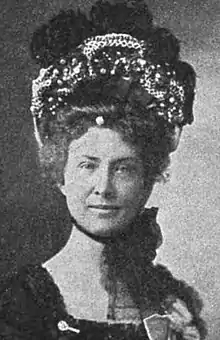Edith Noyes Porter
Edith Noyes Porter (March 26, 1875 – died after 1945) was an American composer, music educator, clubwoman, and pianist, based in Boston, Massachusetts.
Edith Noyes Porter | |
|---|---|
 Edith Noyes Porter, from a 1901 publication | |
| Born | Edith Rowena Noyes March 26, 1875 Cambridge, Massachusetts |
| Died | After 1945 |
| Nationality | American |
| Other names | Edith Noyes Greene (after 1909) |
| Occupation(s) | Composer, music educator, pianist |
Early life
Edith Rowena Noyes was born in Cambridge, Massachusetts, the daughter of Charles Claudius Noyes and Jeanette Mabel Pease Noyes.[1] Her mother was better known as Boston contralto singer Jeanette Noyes Rice.[2] Edith Noyes studied piano with Edward MacDowell and composition with George Whitefield Chadwick.[3]
Career
Edith Noyes began publishing her works while she was a teenager.[3] She composed songs, hymns, instrumental works for piano and violin, an operetta, Last Summer, and an opera, Osseo.[4][5] Last Summer was produced in 1900 as a benefit for the Quincy Hospital.[6] She also taught piano in Boston.[7]
In 1895, Noyes started the first MacDowell Club, a music performance and appreciation club in Boston, named as a tribute to her piano teacher.[8][9][10] She was founder (in 1911) and president of the city's Music Lovers' Club,[11][12] and was a member of the Chromatic Musical Club.[13]
Edith Noyes Greene promoted the work of disabled "cowboy" painter Floyd Niles Walser.[14] In 1929, she hosted a weekly radio show highlighting Boston musicians and events.[15] In 1933, she directed a concert benefiting the Peabody Home for Crippled Children.[16]
Personal life
Edith Noyes married educator Henry Whitcomb Porter in 1898. They had a son, John Whitcomb Porter, and divorced in 1908.[17][18] She married again, to fellow pianist Roy Goddard Greene, in 1909. On the Greenes' wedding trip to Europe in 1909, they stayed with Ignacy Jan Paderewski in Switzerland and she studied with conductor Emil Paur.[19] Roy Greene died in 1946, and Edith Noyes Greene was listed in his death notice as his survivor.[20]
Her house is included in historical tours of Framingham.[14]
References
- International Who's who in Music and Musical Gazetteer. Current Literature Publishing Company. 1918. pp. 460-461.
Charles Claudius Noyes.
- Elson, Louis Charles (1915). The History of American Music. Macmillan. pp. 307.
Edith Noyes Porter.
- Smith, Dexter; Deland, Lorin Fuller; Tapper, Thomas; Hale, Philip (February 1901). "Mrs. Edith Noyes Porter". Musical Record and Review: 12.
- "Edith Noyes Porter as Composer and Woman". Musical Courier: 10. May 29, 1907.
- Ford, Karrin Elizabeth. "Diverging Currents: Women Composers, Musical Institutions, and The Criticism of the 'Old Guard' in Fin de Siècle Boston" (Ph.D. dissertation, University of Connecticut 2011): 59. via ProQuest.
- "Comedy and Opera; Entertainment in Aid of Quincy Hospital". The Boston Globe. December 15, 1900. p. 8. Retrieved December 5, 2019 – via Newspapers.com.
- "Boston". Musical Courier: 31. May 15, 1907.
- "The MacDowell Club's Concert". Musical Courier: 36. April 3, 1907.
- Yackley, Elizabeth A. "Marian MacDowell and the MacDowell Clubs" (M. A. Thesis, University of Maryland 2008): 16-17.
- "Boston's Prominent Musical Organizations". Boston Post. January 2, 1902. p. 4. Retrieved December 5, 2019 – via Newspapers.com.
- "New England Entertains National President". The Musical Monitor: 483. June 1921.
- "Boston Club Celebrates Armistice Day". Musical Monitor. 9: 108. December 1919.
- "A Young Woman Composer". Boston Home Journal. 56: 14. December 15, 1900.
- "Historical Society Plans House Tour". The Boston Globe. December 30, 2001. p. 81. Retrieved December 5, 2019 – via Newspapers.com.
- "Program for 'Shut-Ins'". The Boston Globe. November 30, 1929. p. 21. Retrieved December 5, 2019 – via Newspapers.com.
- "Vendome Concert and Fair". The Boston Globe. December 6, 1933. p. 19. Retrieved December 5, 2019 – via Newspapers.com.
- "Wives Testify" The Boston Globe (January 31, 1908): 3. via Newspapers.com
- "Must Pay Wife Alimony". The Philadelphia Inquirer. February 12, 1908. p. 4. Retrieved December 5, 2019 – via Newspapers.com.
- "Untitled news item". The Boston Globe. May 23, 1909. p. 51. Retrieved December 5, 2019 – via Newspapers.com.
- "Death notice: Greene". The Boston Globe. January 5, 1946. p. 8. Retrieved December 5, 2019 – via Newspapers.com.
External links
- Rebecca Hunt, "Women Composers in Turn of the Century Boston" Boston Public Library (March 1, 2019).
- Edith Noyes Porter at Find a Grave